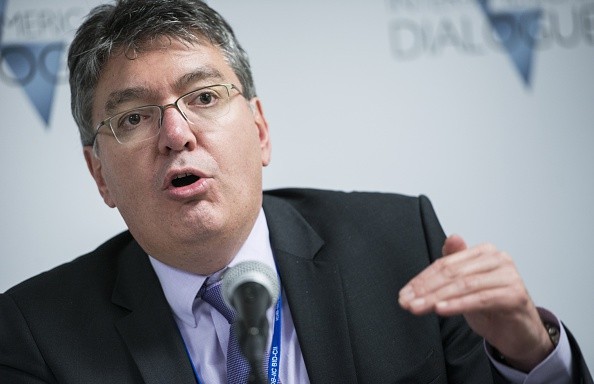A Conversation with Mauricio Cárdenas

"Colombia has a remarkable economy," Finance Minister Mauricio Cárdenas said Thursday at the Inter-American Dialogue, highlighting the country's growth rate, which was revised upward by the International Monetary Fund Wednesday to 4.8 percent for the year, at the same time that the IMF revised its region-wide growth estimate downward.
"If I were to pick one statistic to highlight, it would be the investment rate, which has gone from 14 percent 15 years ago ... today it's 30 percent of GDP, the highest in Latin America " Cárdenas said. Investment has become the key to the country's development goals, Cárdenas noted, which is why the government passed a fiscal rule during President Juan Manuel Santos' first term to put a ceiling on the deficit and reduce debt so investors "see commitment to fiscal responsibility." And maintaining investor confidence was a goal as the government presented a controversial tax proposal to Congress last week, he added.
The bill, which is intended to close a financing gap of $26.2 billion over the next four years, has three parts: a wealth tax, a surcharge on corporate earnings and a financial transaction tax. The first two taxes are already in place but under proposed legislation would be extended for four years, while the corporate profit tax would be raised.
The government says the additional revenues are necessary to expand social programs and close the gap between rural and urban Colombians. The money raised would go to infrastructure, sanitation, irrigation and especially early childhood education, the minister said. "That's where we need the resources," he added. Currently, 2.4 million children younger than five years of age live in households below the poverty line and cannot afford preschool, according to the government. "Age five is too late to begin" education, Cárdenas said. The minister characterized the reform as "progressive taxation," saying the intent of the legislation is to target revenue to the poor, leave the middle class untouched and raise taxes on the top end of the income spectrum.
Another important part of the reform is a new measure to criminalize tax evasion "for the first time in the history of Colombia's legal system," Cárdenas noted. Citizens who don't declare foreign assets worth over $4 million can be charged and face jail time, and the government is seeking tax information exchange agreements with countries it does not already have them with, he said.
Debate on the tax bill in Congress is just starting, but Cárdenas said he is "very optimistic" about the reform's prospects. The government's original proposal, which included not only an extension but an increase in the wealth tax, was revised after objections from business leaders. In a statement released Oct. 3, the day the bill was submitted to Congress, ANDI, Colombia's largest business association, also criticized the continuation of the wealth tax. The organization asked the government to "take advantage of 2015 to make a structural tax reform that eliminates the multiple distortions in our tax system" to make Colombia more competitive.



















